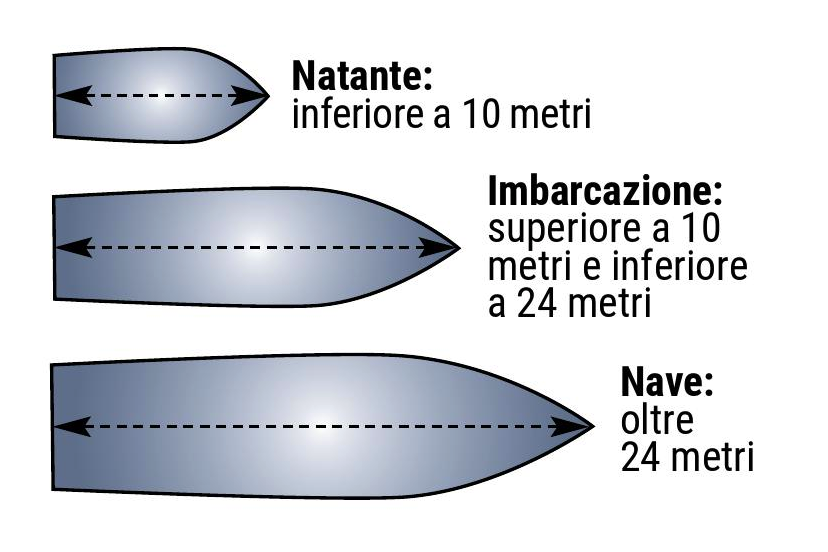

In the Italian legal system, vessels are defined as pleasure craft whose hull, measured according to the harmonized standards EN/ISO/DIS 8666, has a length equal to or less than 10 m, regardless of their propulsion.
Crafts, as a category of pleasure craft, exist only in Italian law.

Vessels are excluded from the obligation to register in the registers of pleasure craft (RID) held by the port authorities, by the maritime district offices and by the civil motorization offices and therefore they are unregistered movable property.
The documents to keep on board the vessel, in the original or in a certified copy of the original, during navigation are:
the declaration of power issued by the manufacturer, or by his legal representative or authorized reseller established in the European Union or, for boats approved before the entry into force of legislative decree 18 July 2005, n. 171, the engine use booklet, for outboard and inboard engines
the EC type-approval certificate and the declaration of conformity issued by the manufacturer
the mandatory civil liability insurance policy for damage to third parties for units equipped with motors of any power
At the owner's request, a vessel may be registered in the registers of pleasure craft. In this case you assume the legal regime of the boats, and you are provided with a navigation license and a safety certificate.
Vessels built according to the technical prescriptions of the European Union Directive 94/25/CE and subsequent amendments are CE marked (after 17/6/1998) and do not have a navigation limit from the coast, but 4 types of navigation linked to weather conditions:
When the weather and sea conditions exceed the limits of the design category, the vessel has the obligation to repair in the nearest safe harbor.
Vessels not marked CE (before 17/6/1998), on the other hand, have navigation limits linked to the distance from the coast:
However, it should be noted that the possibility of navigating without any limit from the coast and in particular beyond 12 miles with an EC vessel is nullified by the 1982 Montego Bay Convention (which entered into force in 1994) which - providing for the possibility of control in waters also by military vessels and in any case the need for certain identification of the nationality of the unit subjected to possible control - requires the presentation of suitable documentation, which is available only to the vessel which, once registered, assumes the legal status of vessel.
A naval vessel, without elements of identification, flag and without documents on board, as in the case of a vessel, constitutes a classic example of violation of art. 91 of the aforementioned Montego Bay Convention on the recognition of the "nationality of ships" in international waters and therefore can be stopped and accompanied to the first landing for the checks deemed necessary. In the specific case, the sanctions provided for by the State of origin of the military vessel which carried out the detention are applied, which vary from country to country.
Finally, it should be remembered that boats are covered by compulsory insurance for the authorized navigation limits (6 or 12 miles) and in the event of an accident at sea in which people are also involved, with injuries or otherwise, the insurance company will not provides for compensation for damages, when it is proved that the vessel sailed beyond the authorized limits and above all in non-Italian waters.